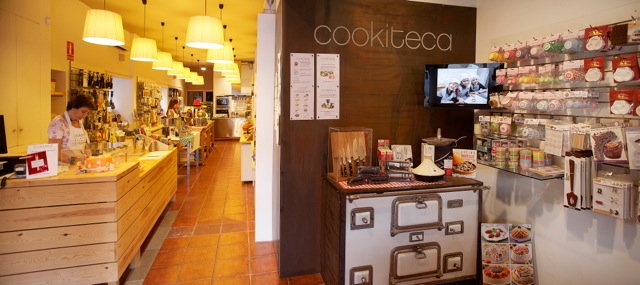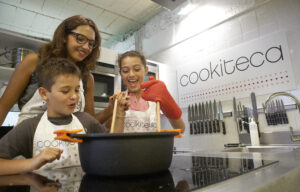It is 5.30 on a Friday afternoon. After hanging up their coats, and carefully washing their hands, 15 children excitedly open their eyes as they enter a kitchen larger than the front room of their homes. There was a rising crescendo of murmured admiration. One of the children, Julia, has invited the others to celebrate her birthday. However, this was not going to be a conventional birthday party; rather they were going to have fun learning, and then eating, a cake. Hopefully, there will be enough left over for them to take samples home to show their families.
The party was taking place at Cookiteca, a new business that is hard to define yet easy to understand and love. This Barcelona-based firm is less than 30 months old, yet it has already opened four locations and served more than 11,000 clustomers. The firm is managed by the two partners Sílvia Mirabet and Neus Canal.
When Neus describes the business she uses different ways according on who is he addressing. She tells suppliers that Cookiteca is a cooking course centre and a shop. However, she tells prospective clients: ‘Cookiteca is a place where you can enjoy cooking and have a good laugh’.
History
Neus is an architect, entrepreneur, and business consultant. I met her when she came to visit me at ESADE to discuss attending a 3.5 day course in retail innovation. Registration for the course would cost €3000 and it was clear that she wanted to make the very most of her time and money. I was delighted with her vision and focused energy.
Cookiteca began in January 2010 when Sílvia, a cooking lover, asked Neus for advice about a business concept based on cooking. The idea hinged on the fact that it was easy to find cooking courses, but very difficult to find utensils and ingredients. They founded the business in May and opened their first location four months later in an attractive building in the traditional neighbourhood of Sarrià in Barcelona.
On entering Cookiteca and seeing a display of semi-professional cooking tools you might feel that you had entered a rather stylish kitchen utensil shop. To one side is the reception desk that doubles as a cash desk. Enter a little further inside and you will find an area displaying utensils and ingredients for making desserts. This area leads on to a very large and well-equipped kitchen where cooking classes are given. But it does not end here, further on there is a room with a large table where participants can taste what they have just prepared. On their way out, participants can buy some of the more unusual ingredients used in the class.
This is a guild-breaker retail formula: it is simultaneously a kitchenware store, a specialist bookstore, a cooking school, a restaurant, and a grocery. And sometimes it is also an event planning company, whether it is for individuals or companies.
Who does Cookiteca serve?
One of the strengths of the business is the diversity of segments served. The business aims at three segments – although never simultaneously:
- Adults interested in cooking
- Event planning businesses where the kitchen plays a leading role
- Children
There is a growing public interest in cooking. According to Neus some 20% of people who could cook do not know how – and there are many others who want to expand their abilities by learning a manual skill that is unrelated to their professional work. Neus says that by learning a new skill people gain more self-confidence and escape from daily life tension.
Activities range from a basic healthy cooking course to more skilled and fashionable courses – such as backery. The usual price of registration is between €35 and €45.
Part of its activity is B2B rather than retail. Cookiteca sells active kitchen-based events to local companies: such as cooking demonstrations and tastings. The firm has a psychologist on call who helps clients design specific events.
But it is children who have made Cookiteca famous and remain a vital segment. Children (who must be older than six to follow and enjoy the learning dynamics of the classes) always have plenty of fun cooking and many develop latent abilities. Their self-esteem is also given a boost when they return home with something they cooked themselves. The children make Cookiteca a happy place, and have quickly spread the word about Cookiteca around Barcelona.
In addition to the scheduled courses, various other events and birthday parties are hold (with cooking always as the main event). Self-catering courses for children are organised during the school holidays. The children arrive early in the morning, prepare their breakfasts, eat together, go grocery shopping at the local food market, attend an external workshop, return, then prepare and enjoy lunch together before going home. The course serves as a rounded experience in cooking and working together – while having fun.
Offline and online combined
The company web plays a key role in creating awareness and marketing the cooking classes (25% of places are booked on the web). It is also increasingly used for selling other products.
Cookiteca has not yet offered what will become the main digital interface, a smartphone app, and for the moment the business remains a good example of a start-up that is not technology based.
The current revenue pie shows 35% earned from cooking workshops, and 65% from shop sales. The partners aim to balance both items and expect to reach breakeven soon.
More than cooking
Neus is clear that she does much more than co-manage a cooking school. She is establishing Cookiteca as a strong brand with humanist principles. Neus says the company emphasizes the role of good cooking for well-being, and maximises the fun inherent in group learning.
Brand building, explains Neus, is more important than aggressively aiming at short-term profit.
There are two essential elements for building the business:
- A competent and enthusiastic team – perhaps the most difficult element to achieve in a retail model.
- A suitable building as “package”, Neus says locations must be: cosy, authentic, practical, inexpensive, and undecorated. The food, she says, tends to provide the colours needed.
My six tasting notes:
My tasting notes for Cookiteca suggest that the business leaves the following after-tastes:
- 1. Cookiteca offers a retail model that understands the economic reality in the street, and treats customers as people.
- 2. Cookiteca has devised a solution tree, with a common trunk (the love for cooking), but with different branches yielding in an unique and intense experiences as fruit
⁃ Using a mixture of products, services, and activities;
⁃ Combining products usually found in very different sectors.
- 3. It is a business model that serves different segments at different moments – but never simultaneously.
- 4. Cookiteca knows how to answer the question that I usually put: ‘what do you mean in my life?’ Cookiteca is a place where I can meet with other ‘foodies’ like me.
- 5. Improvements will come from a better fit between the three dimensions:
⁃ Solution portfolio
⁃ Segments
⁃ Locations (including the online shop)
- 6. Despite requests and having prepared some documentation, Cookiteca does not yet wish to franchise the business because the founders feel that further fine-tuning is needed. Franchising means offering the franchisee a reduced risk of failure, and Cookiteca wants to improve their model first. This is a good example of an ethical business philosophy.
_____________
Lluis Martinez-Ribes
Source: Código 84, nº 169.





